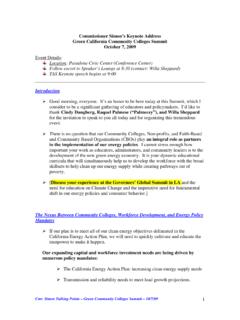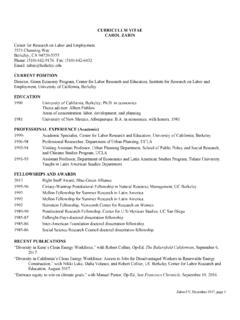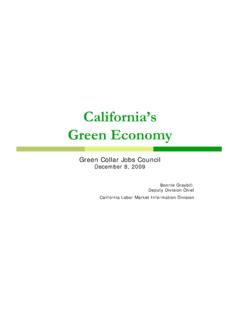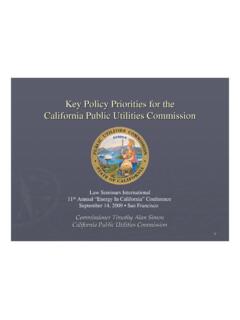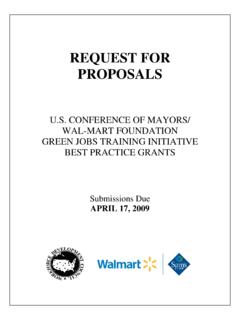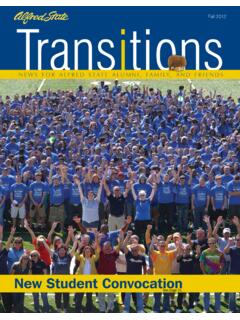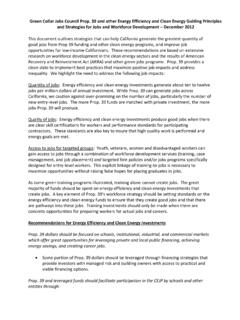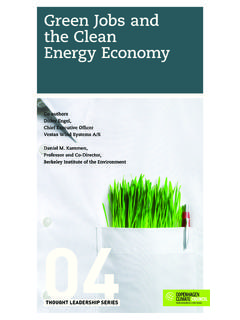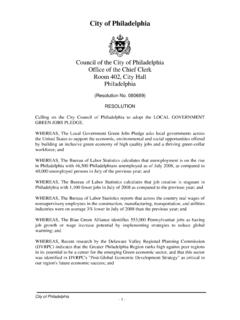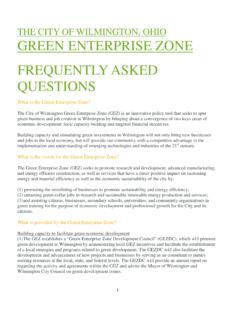Transcription of Assembly Appropriations Committee
1 1 Assembly Appropriations Committee RESOURCES & UTILITIES BILL AUTHOR SUBJECT/FISCAL EFFECT RECOMMENDATION AB 33 Quirk Subject: Home garage charging stations. Requires the California Public Utilities Commission (PUC), in consultation with the California Air Resources Board (ARB) and the California Energy Commission (CEC), to authorize electrical corporations to offer programs and investments in electric vehicle service equipment installed in residential garages by March 30, 2018. Specifically, this bill: 1) Requires the PUC to approve, or modify and approve, each specified proposal filed by an electrical corporation within six months of the date of filing of the completed proposal.
2 2) Requires customers participating in a specified residential garage electric vehicle charging program (Program) to receive electrical service pursuant to a grid-integrated rate. 3) Requires the Program to include a reasonable mechanism for cost recovery by the electrical corporation. 4) Requires the PUC to ensure that all the specified cost recovery by an electrical corporation is nonbypassable and recoverable from all ratepayers. Fiscal: 1) Ongoing annual increased PUC costs of approximately $440,000 (Utilities Reimbursement Account) to review and approve applications within the six month period.
3 2) Minor and absorbable ARB and CEC costs for consultation. 2 AB 79 Levine Subject: Electrical generation from unspecified sources. Requires the California Air Resources Board (ARB) to adopt a methodology to calculate greenhouse gas (GHG) emissions from unspecified sources of electricity. Requires the California Public Utilities Commission (PUC) and California Energy Commission (CEC) to incorporate the methodology into programs addressing disclosure of GHG emissions and procurement of electricity. Fiscal: 1) Initial ARB costs of approximately $525,000 per year for two years to develop the methodology and report to the Legislature.
4 Ongoing costs of approximately $690,000 for the continuation of the same duties and for legal coordination with the Western Climate Initiative and regulation updates. 2) Absorbable Independent System Operator and CEC costs. 3 AB 151 Burke Subject: AB 32 Offset Task Force. 1) Requires the California Air Resources Board (ARB) to report to the Legislature to receive input, guidance, and assistance before adopting guidelines and regulations to implement the scoping plan or rules and regulations to reduce greenhouse gas ( GHG) emissions to at least 40% below the 2020 statewide limit by 2030. 2) Establishes the Compliance Offsets Protocol Task Force to provide guidance to ARB in approving new offset protocols, with a priority on the development of new urban offset protocols.
5 Requires ARB, in conjunction with the Task Force, to develop a multi-tiered incentive system for compliance offset credits, in a specified order. 3) Requires ARB, by January 1, 2019, to report to the Legislature on the need for increased education, career technical education, job training, and workforce development in ensuring that statewide GHG emissions are reduced to at least 40% below the statewide limit by 2030. 4) Requires ARB to work with the Secretary of Labor and Workforce Development, the Workforce Development Board, the Department of Education, California Community Colleges, Trustees of the California State University, Regents of the University of California, interested stakeholders, and the green collar jobs council .
6 Requires the report to include specified policy guidance and recommendations. Fiscal: 1) One-time ARB contract costs of $1,750,000 for expert analysis associated with the report on workforce development [Cost of Implementation Account (COIA)]. 2) Annual ongoing ARB costs of approximately $ to $ million (COIA) for the report on the scoping plan, to develop a multi-tiered incentive system for compliance offset credits through the offset taskforce, and the education, job training, and workforce development requirements. 3) Unknown, but likely less than $150,000 each, for the Secretary of Labor and Workforce Development, the Workforce Development Board, the Department of Education, California Community Colleges, Trustees of the California State University, Regents of the University of California, and the green collar jobs council to consult with the ARB on education, job training, and workforce development.
7 4 AB 166 Salas Subject: Water filtration rebate program. Requires the State Water Resources Control Board (SWRCB), in collaboration with the California Energy Commission (CEC) and other relevant stakeholders, to study the feasibility and financial stability of a water filtration system rebate program for households served by water systems that do not meet primary drinking water standards. This bill requires SWRCB to conclude the study by January 1, 2019, and submit a report to the Legislature, including recommendations to implement the rebate program, by March 1, 2019. Fiscal: 1) SWRCB administrative costs of approximately $140,000 to develop data for the report and an additional $50,000 to $100,000 in contracts to complete the study.
8 2) Absorbable CEC costs. AB 176 Salas Subject: Friant-Kern Canal. Appropriates $7 million General Fund (GF) dollars to the Department of Water Resources (DWR), to fund the Reverse Flow Pump-Back Facilities on the Friant-Kern Canal Restoration Project (Project), as defined in existing law. Specifically, this bill: 1) Appropriates $7 million GF to the DWR for the purposes of fully funding, to the extent permitted, the Project. 2) Makes findings and declarations on the benefits of the Project and the necessity of a special statute for the Friant-Kern Canal. Fiscal: Appropriates $7 million GF to DWR for local assistance to the Friant-Kern Can Restoration Project consistent with the San Joaquin River Settlement Agreement, the projects for which are the sole responsibility of the federal government.
9 5 AB 188 Salas Subject: Vehicle retirement. Requires the California Air Resources Board (ARB) to update the Enhanced Fleet Modernization Program (EFMP) guidelines by March 2018, to allow applicants retiring a high-polluting light-duty pickup truck to replace their vehicle with a light-duty pickup truck that meets the program's fuel economy standards for minivans. Fiscal: ARB anticipates increased one-time contract costs of $100,000 (EFMP funds) over an 18- month period to update the minivan and pick-up truck per gallon requirements to ensure GHG benefit goals are achieved. Because this bill requires ARB to update the guidelines in three rather than 18 months, it is reasonable to assume costs would be much greater, perhaps twice as much or more, if it is even possible to update guidelines in such a short timeframe.
10 6 AB 193 Cervantes Subject: Clean Reused Vehicle Rebates. Establishes an incentive program for the purchase and use of used zero-emission vehicles (ZEVs) and near-zero-emission vehicles (NZEVs). Specifically, this bill: 1) Requires the California Air Resources Board (ARB) to establish the Clean Reused Vehicle Rebate Project (CRVRP) within the Air Quality Improvement Program (AQIP) by July 2019. 2) Limits rebates or other incentives issued to one per vehicle. 3) Limits rebates or other incentives to low- and moderate-income consumers living in disadvantaged communities (DACs) or in counties where less than 2% of total rebates of Clean Air Vehicle Rebate Project (CVRP) rebates have been issued and in air districts designated by ARB as non-attainment areas.
